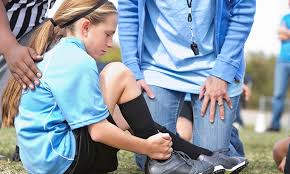
How are things different this year with COVID-19?
- Many sports teams saw their seasons cancelled this year and others weren’t allowed to participate in preseason practice or attend summer sports camps. Hopefully, those athletes were staying active, but we know many may have been staying in and playing video games or just not being as active as normal. The risk of injury is greater when athletes aren’t conditioned or ready to play.
Top 3 sports injuries seen in the E.R.
- Concussions: Change in level of alertness, extreme sleepiness, vomiting, bad headache, seizure
- Fractures/Sprains: Snap/grinding noise, swelling, bruising, tough to move, warmth & redness, pain in joint
- Lacerations: Minor cuts can be treated by rinsing the wound with water and applying pressure with sterile gauze, a bandage or clean cloth
When do you bring your child to the E.R?
- Serious injury to head, neck or back, any loss of consciousness, numbness, if the wound is large or deep, or if bleeding won’t stop.
Prevention Tips
- Always wear proper gear, that fits well, for your sport. (including shoes)
- Train properly.
- Warm up.
- Avoid specializing in one sport for kids under the age of 12.
Elite athletes choose a sport and give it their all. But, more and more research shows that specializing in one sport can take a toll on young athlete’s bodies, leading to overuse injuries. These are chronic injuries that may not seem serious at first, but if not treated usually get worse.
If you are concerned about your child’s feet, call us today.
0800 473 776
(09) 212 9612
